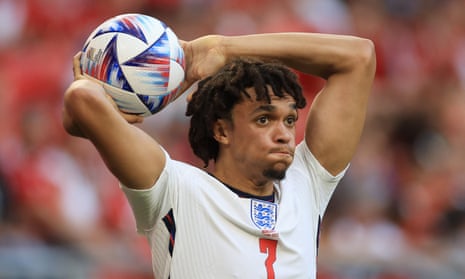Kick-ins could replace throw-ins, after football’s lawmakers agreed to authorise trials of the idea.
The argument for a kick-in is that it can be completed more quickly than a throw-in and would speed up the process of returning the ball to the field of play. The Dutch second division has expressed interest in trying it out and the International Football Association Board (Ifab) gave the go-ahead after its AGM on Monday.
Arsène Wenger, Fifa’s head of global football development, has previously come out in favour of trying a kick-in. Suggesting that the game needed to speed up to preserve the attention of younger generations, last year Wenger said: “There are two big time-wasters at the moment, that is throw-ins and free-kicks, and a little bit goal-kicks as well because when you play out now in the box.
“The target is to make the game more spectacular and quicker, and maybe with throw-ins you could play with your feet, but in a limit of five seconds for example, things like that.”
Ifab made its announcement alongside a series of other measures, including trials of a “fairer calculation of playing time”, which could include the introduction of a “stop clock” whereby time is paused whenever the ball is not in play. It comes after data showed the ball was in play for only 55 minutes and three seconds during the average Premier League match in the 2021-22 season, with the Champions League average a minute more.
In a statement, Ifab said: “Other trials such as explaining certain refereeing decisions during a game, a potentially fairer calculation of playing time, and kick-ins were also discussed. The AGM was clear that these and any other trials require permission and will be supervised by the Ifab and Fifa.”
Ifab also revealed that trials of concussion substitutes are to be extended for another year “to gather sufficient data to form a scientifically valid decision”, after the previous 18 months of trials proved insufficient. The possibility for referees to wear body cameras to lessen the risk of physical and verbal abuse will be trialled at grassroots level.
